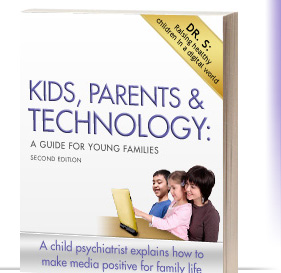06.11.2010
Hooray! After over a decade of relative chaos and over-emphasis on safety, we are finally seeing how, as usual, while created to serve us, tools have profound effects on us. It is about time: In recent days, a spate of articles have peppered media about the effects on humans of technology. They comprise of two categories: Cognitive neuroscience and social-familial. There are alarmists and there are technophiles. Slow-to-come new research is reported, and experts are interviewed to put it in context.
So far so good. But other than piquing curiosity, this mostly alarmist reportage is piecemeal and offers scant practical advise. “In fact, parents tell me that they are left frustrated and without a comprehensive approach and practical tools. ‘What are we supposed to do?’ They are very concerned, and many try to restrict access and time, while others claim ignorance and shrug their shoulders helplessly. None of this works very well,” according to Dr. Eitan Schwarz, a veteran Chicago child-psychiatrist who uses media as play therapy in his practice.
“Let’s get positive! Technology is here to stay and can be great for families and kids. We know lots about what is good for kids and families. Now let’s apply solid principles of good parenting to home technology consumption. Parents need a comprehensive, hands-on set of tools that will integrate technology into good parenting practices. Whatever new device comes, and surely they will keep coming, parents should be able to decide about its use in their homes and in children’s hands just as they make choices about education, recreation, and nutrition,” states Dr. Schwarz and elaborates on www.mydigitalfamily.org. Dr. Schwarz’s just-released “Kids, Parents & Technology: An Instruction Manual for Young Families” is available in paperback and all electronic forms.
“This is a crucial part of life now. There is no quick fix here. Parents need to commit themselves to learn about technology, and use it as they do other home appliances. No technology gadget belongs near kids if it does not serve family life or their development. Period.”
Sources:
https://mydigitalfamily.org/?page_id=249
http://www.nytimes.com/2010/06/10/garden/10childtech.html
http://www.nytimes.com/2010/06/10/technology/personaltech/10basics….
http://www.sfgate.com/cgi-bin/article.cgi?f=/n/a/2010/06/09/financial/f210458D34.DTL&tsp=1
http://www.nytimes.com/2010/06/07/technology/07brain.html?nl=techno…
http://www.nytimes.com/2010/06/07/technology/07brainside.html?nl=te…
http://www.nytimes.com/interactive/2010/06/07/technology/20100607-t…
http://www.nytimes.com/interactive/2010/06/06/business/kord-pano.ht…
http://bits.blogs.nytimes.com/2010/06/07/unplugged-take-the-challen…



Increased Media Coverage Leaves Cyberparents Even More Helpless
06.11.2010
Hooray! After over a decade of relative chaos and over-emphasis on safety, we are finally seeing how, as usual, while created to serve us, tools have profound effects on us. It is about time: In recent days, a spate of articles have peppered media about the effects on humans of technology. They comprise of two categories: Cognitive neuroscience and social-familial. There are alarmists and there are technophiles. Slow-to-come new research is reported, and experts are interviewed to put it in context.
So far so good. But other than piquing curiosity, this mostly alarmist reportage is piecemeal and offers scant practical advise. “In fact, parents tell me that they are left frustrated and without a comprehensive approach and practical tools. ‘What are we supposed to do?’ They are very concerned, and many try to restrict access and time, while others claim ignorance and shrug their shoulders helplessly. None of this works very well,” according to Dr. Eitan Schwarz, a veteran Chicago child-psychiatrist who uses media as play therapy in his practice.
“Let’s get positive! Technology is here to stay and can be great for families and kids. We know lots about what is good for kids and families. Now let’s apply solid principles of good parenting to home technology consumption. Parents need a comprehensive, hands-on set of tools that will integrate technology into good parenting practices. Whatever new device comes, and surely they will keep coming, parents should be able to decide about its use in their homes and in children’s hands just as they make choices about education, recreation, and nutrition,” states Dr. Schwarz and elaborates on www.mydigitalfamily.org. Dr. Schwarz’s just-released “Kids, Parents & Technology: An Instruction Manual for Young Families” is available in paperback and all electronic forms.
“This is a crucial part of life now. There is no quick fix here. Parents need to commit themselves to learn about technology, and use it as they do other home appliances. No technology gadget belongs near kids if it does not serve family life or their development. Period.”
Sources:
https://mydigitalfamily.org/?page_id=249
http://www.nytimes.com/2010/06/10/garden/10childtech.html
http://www.nytimes.com/2010/06/10/technology/personaltech/10basics….
http://www.sfgate.com/cgi-bin/article.cgi?f=/n/a/2010/06/09/financial/f210458D34.DTL&tsp=1
http://www.nytimes.com/2010/06/07/technology/07brain.html?nl=techno…
http://www.nytimes.com/2010/06/07/technology/07brainside.html?nl=te…
http://www.nytimes.com/interactive/2010/06/07/technology/20100607-t…
http://www.nytimes.com/interactive/2010/06/06/business/kord-pano.ht…
http://bits.blogs.nytimes.com/2010/06/07/unplugged-take-the-challen…